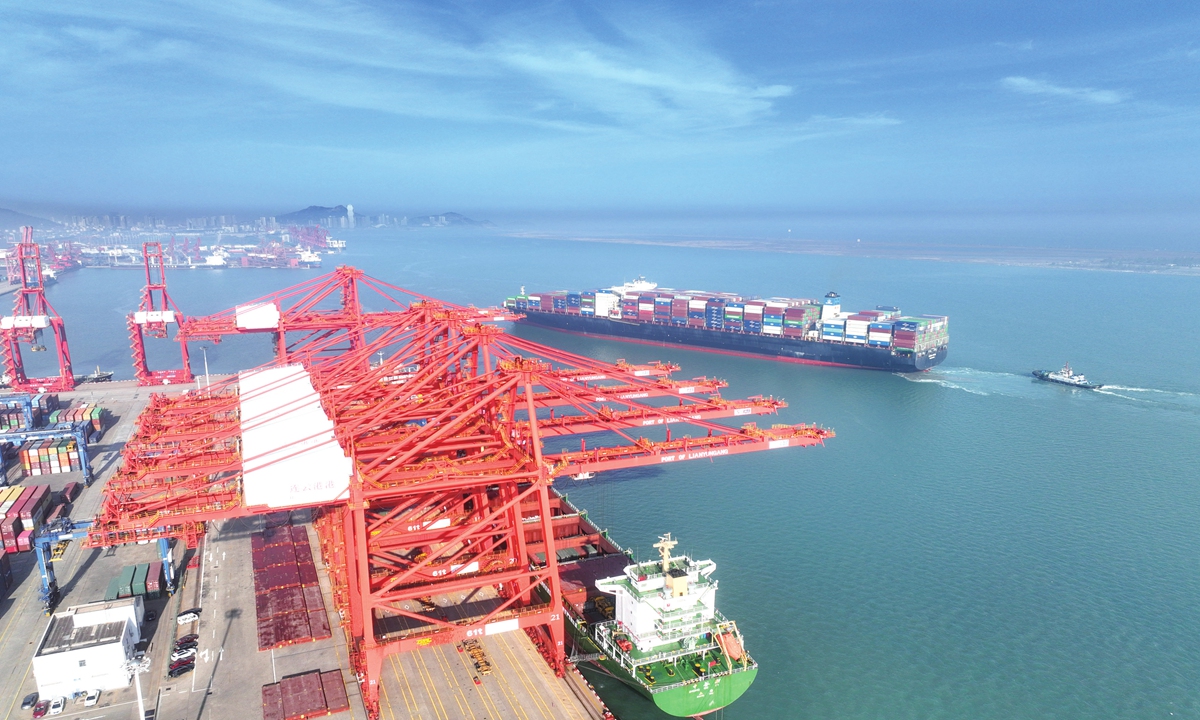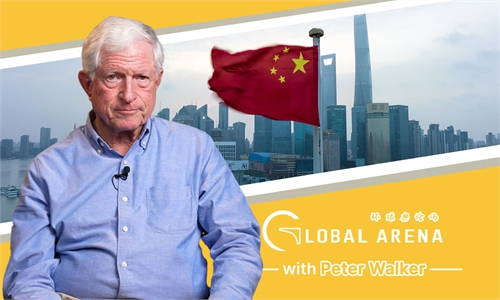Why the economic field has become a prominent battlefield for Western cognitive warfare against China
Why economic field has become battlefield for West's cognitive warfare


A cargo ship loaded with containers is ready to berth to unload cargo on April 12, 2024 in Lianyungang, East China's Jiangsu Province. Photo: VCG
Editor's Note: The current intense negative coverage of the Chinese economy by Western media outlets shows that the US-led West is launching cognitive warfare against the Chinese economy, which remains stable and increasingly resilient in the face of headwinds and challenges.
Although the "China collapse theory" and other fallacies have been debunked, Western media outlets are relentlessly concocting new terms to discredit the Chinese economy from various perspectives.
In response to this coordinated smear campaign, the Global Times is publishing a series of articles to counterattack this drive, specifically addressing the absurd hype about the "lack of transparency in Chinese economic data," "overcapacity in China," and "deflation in the Chinese economy" among others.
Recently, in Western public opinion, the "China threat theory" and the "China collapse theory" in the economic field have given rise to new forms of hype, including the "China overcapacity theory," "China shock 2.0 theory," "China peak theory" and "China being marginalized theory."
After the "China threat theory" and the "China collapse theory" collapsed on their own, these new forms of hype have caused a certain degree of confusion.
The Global Times Research Center conducted a study of economic reports related to China published by 14 major media outlets in the US, the UK, France and other countries from January 1 to March 15. Among them, 72 typical negative economic reports on China were selected for in-depth analysis, forming a research report on "negative economic reports on China by mainstream foreign media."
Through this report, it can be seen that the new forms of hype are not much different from the old clichés disparaging the Chinese economy.
Rampant smearing clichés
For instance, the "overcapacity theory" hype has become rampant. During US Treasury Secretary Janet Yellen's visit to China, she expressed concerns multiple times about the "overcapacity issue" in China's new-energy industries. Yellen and some other Western politicians and media outlets have been spreading this groundless guesswork.
They claim that, due to government subsidies, there is overcapacity in China's new-energy sector, and this excess capacity is being dumped overseas at low prices, affecting the economies of other countries. Not only do the relevant data fail to support the claim of "overcapacity in China's new-energy sector," but also products such as Chinese new-energy vehicles are generally sold at higher prices overseas than domestically, and this has nothing to do with "dumping at low prices."
There are also some Western media outlets trying to sensationalize a new wave of the "China shock theory" by hyping the "overcapacity theory" and claiming that surging Chinese-made new-energy vehicles, lithium-ion batteries and photovoltaic products, among others, in the international market may cause "China shock 2.0."
What they selectively ignore is that, in recent years, China has continuously increased its technological innovation capabilities, promoted industrial transformation and upgrading and rapidly developed industries such as new energy, forming a competitive advantage in the global market.
This is originally the result of the normal operation of market economy laws, but now it is being slandered and targeted. This ridiculous Western slander is like a student who doesn't study well but focuses on watching good students and insists that others are cheating on exams.
If the "China overcapacity theory" and the "China shock 2.0 theory" are variants of the "China threat theory," then regarding the "China collapse theory," what has been continuously spreading recently is the "China peak theory" and the "China being marginalized theory".
The so-called "China peak theory" cannot withstand scrutiny in terms of data and analysis.
Former Australian prime minister Kevin Rudd once noted that Chinese consumer market is unprecedented in global economic history. In addition, with the strong US push to shut China out of production and supply chains, there is now a growing trend of "China being marginalized" on domestic and international social media platforms, which exaggerates the idea of China becoming increasingly isolated from the world.
These terms used to slander China's economy have recently emerged in a concentrated fashion, representing a typical manifestation of Western countries such as the US using cognitive warfare to besiege China's economy.
In the current complex international environment, the traditional dichotomy of peace and war no longer effectively describes and explains the reality of the international environment. Some scholars have proposed the concept of the "gray zone," which refers to "intense political, economic, information and military competition between countries that does not escalate into conventional warfare." As the "gray zone" spreads, cognitive warfare has become an important form of international competition.
The development of social media has increased the possibility of influencing public cognition and behavior through internet traffic, flow and content. Modern economies and financial markets are largely driven by the psychology and emotions of investors, highly dependent on information, confidence and expectations.
Participants' expectations of future economic development and policy changes can also more or less affect the performance of stock, bond and foreign exchange markets, making the economic field more likely become a battlefield of cognition warfare.
Full-fledged US attack
Cognitive warfare is a kind of systemic engineering, involving different participating entities, different forms of communication, different forms of text, different media behaviors and different communication platforms.
For example, the US has at least 33 cognitive warfare units, distributed across multiple divisions such as the State Department, Department of Defense and intelligence agencies, with a government coordination mechanism as the central hub. Intelligence agencies are better able to directly undertake cognitive warfare tasks, and they are deeply involved in so-called "smear propaganda."
The concentrated statements from the US on the "China overcapacity theory" are typical examples. In addition to Yellen, Jay Shambaugh, under secretary for international affairs at the US Department of the Treasury, stated that overcapacity in China is going to wind up hitting world markets. US ambassador to China R. Nicholas Burns expressed concern about China's potential overcapacity. He said that China allows enterprises to export products such as solar panels and electric vehicles (EVs) at artificially low or even dumping prices through various subsidies, which would lead to unfair competition and disrupt the global trade system, according to media reports.
In recent years, US government-led cognitive warfare coordination has become more mature, focusing on "decentralization" and "flattening" as core principles, aiming to achieve linkages among multiple centers and levels, and proposing the so-called global model, which is to distort the perception of target countries by third-country audiences in global information and communication activities using their influence.
When it comes to specific economic issues in China, the US not only tries to influence Chinese audiences to form opinions favorable to the US on key issues such as the Chinese economy and business environment, but also seeks to influence audiences in other countries to form a consensus favorable to the US on issues related to China.
More importantly, the US cognitive war against China not only focuses on short-term strategic goals and tactical actions, but also emphasizes long-term changes in the cognitive structure and values of the target forces. It particularly focuses on manipulating public opinion and using social media and organizational structures to guide the cognition and behavior of social groups, and it has a typical tendency toward hybrid warfare. Therefore, it is necessary to understand the risks and harms of cognitive warfare from a longer time span and strategic perspective.
China fighting back
International politics has become "discourse politics" to some extent since the Cold War. Once a certain discourse gains a dominant position of power, it can put on a "legal garment" to its value orientation through repressive and constructive functions.
That is to say, the US can still disseminate and confuse a considerable portion of the public through its own hegemony of discourse with all kinds of rhetoric constructed against China, even if this can't stand the test of facts.
The rise of multi-party interactive intelligent communication models has resulted in the delivery of economic information to focus more on "cognitive construction" and "risk guidance" rather than the traditional forms of "information dissemination" and "opinion dissemination." In the face of the cognitive war against China's economy, some people have not only become "information captives," but they have even fallen into it and become disseminators.
The major means for the current cognitive war against China are various forms of data and algorithmic technology while using social media as the main implementation platform, aiming to undermine people's trust in economic policies, interfere with public confidence in economic development and influence corresponding expectations through precise information targeting. This has become a new hidden and effective force to influence the economic situation and future development.
Individual countries are also continuing to instigate cognitive war activities to maintain and strengthen their own hegemony and cause chaos in the economic sphere and instability globally, which has been detrimental to the overall interests of humanity. In this regard, we not only need to have a clear understanding of the situation, but also need to make targeted responses.
Cracking down on the cognitive war against China in the economic field is a complex and systemic task that requires the comprehensive use of various means, including political, economic means and public opinion, as well as sustained efforts and synergistic cooperation in various fields to further improve the national strategic communication system with its own characteristics.
It is important to strengthen cooperation and coordination among relevant institutions, break down the barriers of resources, data and information in the strategic communication system, and standardize the implementation of the whole process of strategic communication. Various subjects and links can be connected together, while realizing the integration of strategic objectives, communication methods and evaluation of effects to give full play to institutional advantages.
From the strategic perspective, it is necessary to incorporate new technologies, platforms, channels, topics and means into strategic communication. It is important to be highly aware of the application of "socialization", "grid" and "intelligence" in strategic topics, and make full use of diverse communication forms and media to establish a direct link between the grand concepts of strategic communication and personal experience to demonstrate a true, three-dimensional and comprehensive image of China's economy.
Tang Jingtai is professor at the School of Journalism, Fudan University, and Xing Chen is postdoctoral fellow at the School of Journalism, Fudan University. bizopinion@globaltimes.com.cn


